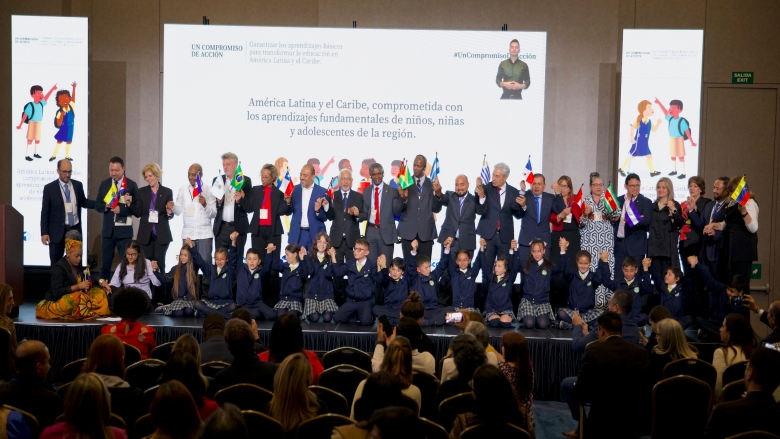Bogota, Colombia March 22, 2023 - Education ministers and government representatives from Latin America and the Caribbean reaffirmed today their commitment to promote urgent educational recovery in the region after the losses recorded during the pandemic and to guarantee basic learning for all children.
Under the leadership of the Colombian Ministry of Education, authorities in the education field are meeting this week in Bogota to discuss and agree on concrete measures to ensure that all children and adolescents, especially those in vulnerable situations, develop the basic learning skills (reading, writing, mathematics, and socioemotional skills) that will enable them to develop their full potential, achieve integral participation in society, and the continuity in their learning.
Despite significant efforts by governments, teachers and parents, children have lost, on average, 1.5 years of learning during the pandemic. After two years of school closures in the region, learning outcomes could have been set back more than ten years. The youngest and poorest have been hardest hit. Preliminary evidence from several countries shows greater losses at the primary than at the secondary level and among students at the lowest socioeconomic levels. Collective learning losses will hurt Latin America and the Caribbean in the future, exacerbating inequalities and jeopardizing economic growth.
This meeting is part of the initiatives under the Commitment to action on basic learning and its recovery, an official mechanism promoted globally by the World Bank, UNICEF, UNESCO, USAID, the UK Foreign, Commonwealth & Development Office (FCDO), the Bill and Melinda Gates Foundation, and more recently, in Latin America and the Caribbean, by the IDB, the Inter-American Dialogue and the Secretariat of Education of Bogota. Its purpose is to get governments and the education community to implement actions to ensure, at the highest political level, that all the world's children achieve basic learning, and complements a regional commitment launched last year to protect and restore learning.
"The educational losses in our countries represent a real catastrophe, it is urgent to work to reverse them as soon as possible and with special attention to the youngest and most vulnerable," said Luis Benveniste, regional director of Human Development at the World Bank. "The commitment to education is a fundamental tool, which is supported by the notion that no one should be left behind, the only way to move towards sustainable and inclusive development."
"In Latin America and the Caribbean we are experiencing an unprecedented educational crisis that will have enormous and lasting repercussions for the whole of society. Currently in our region, due to the effect of the pandemic, projections show that 4 out of every 5 children will not know how to read a simple text. What professional and technical future could they aspire to if, from their childhood, they do not have the fundamental learning skills?" said Garry Conille, UNICEF's regional director for Latin America and the Caribbean.
"If the governments of the region do not take urgent measures to make up for what has been lost and ensure the basic foundations of learning, millions of children and adolescents are at risk of dropping out of school, especially those from indigenous and Afro-descendant communities. Leaving the majority of their childhood without knowing how to read and write is a social and economic cost that Latin America and the Caribbean cannot and should not afford. The future of this crisis is now, we cannot wait any longer to act," said Conille.
"We are living in a historic moment in which we must strengthen cooperation to work for the recovery and transformation of education in our countries. This is a priority after COVID-19 exacerbated educational inequalities and limited the right to education of the most vulnerable populations in Latin America and the Caribbean," said Claudia Uribe, director of UNESCO's Regional Bureau for Education in Latin America and the Caribbean. "The region experienced the longest interruption of face-to-face classes in the world, affecting more than 170 million students and their families. The impacts of this crisis still continue and demand immediate and coordinated actions to rescue the present and future of children and young people in our region".
"Education, and especially the accumulation of basic skills, is key to overcoming structural inequalities, improving social mobility and boosting the productivity growth the region needs. In Latin America and the Caribbean more than 50% of 15-year-olds do not understand what they read and around 60% do not have basic math skills. We need to guarantee basic learning, which is the basis for acquiring the rest of the skills needed to prosper in the 21st century. Changing this reality is within our reach, with evidence-based solutions. Achieving this depends on everyone's commitment to move towards quality education," said IDB Education Chief Mercedes Mateo.
"We hope that this meeting will allow us to leverage the articulated effort between governments, international cooperation agencies, the private sector and the entire citizenry, with the objective of implementing urgent, immediate and firm actions for educational recovery. It is urgent to redouble efforts to eliminate inequalities and achieve educational justice, prioritizing the most vulnerable students," said Sarah Stanton, Education Program Manager of the Inter-American Dialogue.
Reversing the educational costs of the pandemic is a critical task. The strategy to achieve this must continue to focus on getting children back in school and accelerated catch-up learning, prioritizing essential content and addressing challenges such as children's psychosocial well-being and persistent digital gaps.
These efforts will also help ensure basic learning in the long term, and require a clear commitment from policymakers, as well as technical and operational capacity and the necessary resources.

